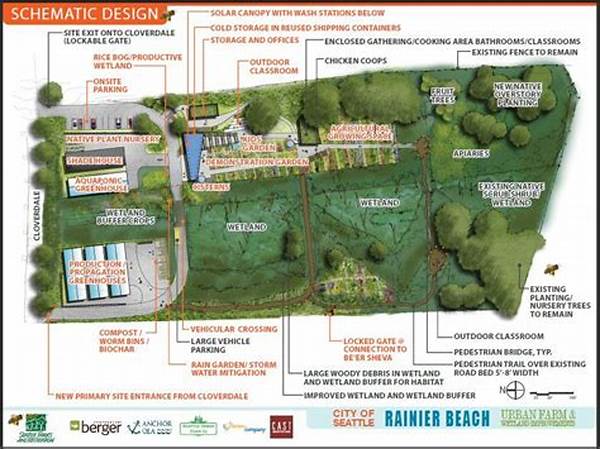In an age where sustainability and community engagement are more crucial than ever, the concept of community urban farm development plans stands as a beacon of hope and innovation. Imagine neighborhoods transformed into vibrant hubs of greenery, producing fresh, organic food right in the heart of urban landscapes. This isn’t just a dream; it’s a reality waiting to be embraced. By participating in these initiatives, you aren’t merely cultivating crops; you’re cultivating community, education, and a healthier environment.
Read Now : Minimalist Geometric Mural Wall Design
The Power of Community Urban Farming
Community urban farm development plans are more than mere gardening projects; they are transformative movements. They provide a unique opportunity to reconnect with nature and learn about sustainable agriculture while fostering a sense of belonging among community members. These farms become the pulse of urban areas, where neighbors can gather, share knowledge, and nurture both plants and social bonds.
Imagine a city where lush, green spaces replace concrete jungles. These farms not only beautify neighborhoods but also reduce urban heat and improve air quality. They empower communities to combat food deserts, ensuring access to fresh produce regardless of socioeconomic status. By supporting community urban farm development plans, we are investing in a healthier, more equitable future for everyone.
Community urban farm development plans are catalysts for change, promoting economic growth through local markets and job creation. They inspire a generation to value sustainability and innovation. When you support these initiatives, you’re voting for a more resilient and inclusive society, a testament to the power of collaboration in building a better world.
The Economic Benefits of Urban Farming
1. Local Economic Growth: Community urban farm development plans boost local economies by creating job opportunities and encouraging the purchase of locally sourced products.
2. Reduced Food Miles: By producing food locally, these plans significantly cut transportation costs and environmental impact, fostering a more sustainable urban environment.
3. Tourism Appeal: Vibrant urban farms attract tourists, increasing foot traffic to local businesses and promoting economic vitality.
4. Real Estate Value: Green spaces enhance neighborhood appeal, often increasing property values in the vicinity of urban farms.
5. Entrepreneurial Opportunities: These plans provide a platform for budding entrepreneurs to launch innovative agribusinesses, fostering creativity and economic diversity.
Educational Impact of Community Urban Farms
The community urban farm development plans offer incredible educational opportunities, instilling valuable skills in participants of all ages. Schools can integrate these gardens into curricula, allowing students to learn about biology, ecology, and sustainability firsthand. By growing their food, children can comprehend the full lifecycle of plants and the importance of environmental stewardship.
Moreover, these educational experiences extend beyond the classroom, fostering intergenerational learning. Parents and grandparents can share their knowledge and skills with younger generations, strengthening family bonds. This hands-on approach to education encourages critical thinking, problem-solving, and teamwork—skills essential for success in any field. Supporting community urban farm development plans means endorsing a brighter educational future for our children and communities.
Environmental Advantages of Urban Farming
1. Biodiversity Support: Community urban farm development plans encourage biodiversity, providing habitats for pollinators and other wildlife.
2. Improved Air Quality: Urban farms release oxygen and absorb pollutants, improving air quality in densely populated areas.
3. Reduction in Urban Heat: Green spaces help mitigate the urban heat island effect, cooling cities and lowering energy consumption.
4. Waste Reduction: Urban farms often implement composting systems, turning organic waste into valuable nutrients for soil.
Read Now : Neutral Wall Decorations
5. Water Management: These farms incorporate rainwater harvesting and efficient irrigation techniques, promoting responsible water use.
6. Pollution Mitigation: Vegetation filters pollutants, reducing the overall carbon footprint of urban areas.
7. Community Engagement: By involving citizens in farming activities, these plans raise awareness about environmental sustainability.
8. Sustainable Practices: Practices such as crop rotation and permaculture minimize environmental impact and boost soil fertility.
9. Carbon Sequestration: Plants in urban farms capture carbon dioxide, contributing to climate change mitigation efforts.
10. Resilience to Climate Change: Diverse crops and sustainable farming methods enhance food security in uncertain times.
Social Cohesion Through Urban Farming
At the heart of community urban farm development plans is the power to unite diverse individuals under a shared purpose. Imagine residents from different backgrounds coming together to work towards a common goal—creating a sustainable food system. These communal spaces break down social barriers, fostering trust and understanding among neighbors. In today’s fast-paced world, where genuine connections are rare, urban farms offer an oasis of community spirit.
Social events, workshops, and farmer’s markets hosted within these urban farms create platforms for cultural exchange and mutual respect. Sharing responsibilities and celebrating the harvest together strengthens community resilience, preparing neighborhoods to face future challenges cohesively. Supporting community urban farm development plans isn’t just about growing food—it’s about fostering a sense of togetherness and inclusivity.
The Health Benefits of Urban Farming
Community urban farm development plans also have profound health impacts. Access to fresh fruits and vegetables is crucial in combating lifestyle diseases like obesity and diabetes. These farms encourage healthier eating habits by making nutritious options readily available. Additionally, the physical activity involved in maintaining the gardens promotes fitness and mental well-being.
Urban farms are sanctuaries for those seeking peace and relaxation away from the hustle of city life. Engaging with nature has been proven to reduce stress and anxiety, enhancing mental clarity and overall happiness. By championing community urban farm development plans, you are contributing to a healthier, happier society for all.
In Summary
The importance of community urban farm development plans cannot be overstated. They are blueprints for a sustainable future, offering multifaceted benefits across economic, educational, environmental, and social dimensions. These plans embody the essence of community collaboration, striving to create a world where harmony with nature is not just desired but achieved. However, achieving these ambitious goals requires buy-in from every one of us. By supporting and participating in community urban farm development plans, we are not only improving our environment but also investing in the growth of interconnected communities bound by shared values and aspirations.
To ignore these opportunities is to miss out on a chance to revolutionize urban living. Together, we can transform cities into green sanctuaries of innovation and health. Community urban farm development plans invite us to rethink how we live, work, and coexist in modern society. Let’s invest in these plans to ensure a sustainable, inclusive, and thriving future for all.





